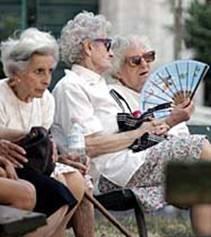|
|
As the Heat Rises, So Do Concerns for Elderly
By Elisabeth Rosenthal, International Herald Tribune
Europe
June 30, 2005

After several days of early and intense summer heat, doctors and governments across Europe are girding themselves for a rise in health emergencies among the elderly, hoping to avoid a repeat of 2003, a scorching season that saw more than 35,000 heat-related deaths across the Continent.
The summer of 2003 was the hottest recorded since 1510. But, because of global warming, such heat is likely to become the norm rather than the exception in Europe in the next 40 to 50 years, scientists say.
That trend, combined with increasingly elderly populations throughout Europe, will require countries to re-think their summer strategies.
"According to our predictions, summers like 2003 will become much more common, occurring perhaps every other year," said Peter Stott, a climate scientist at the Hadley Center of the U.K. Meteorology Center. "So countries will need to adapt in various ways, with buildings designed to keep out the heat, and better air conditioning, for example."
After three days of scorching temperatures in Italy, France, Switzerland and Germany this week, health officials opened emergency hot lines and media issued warnings to the elderly to drink more and avoid going out at peak hours.
Temperatures in Rome, Paris and Zurich exceeded 32 degrees Celsius, or 90 degrees Fahrenheit, but reached above 35 in some cities. After the heat wave in 2003, Swiss researchers determined that most heat deaths occurred in cities with a combination of peak daytime temperatures over 35 degrees and night temperatures that never descended below 20, said Leticia Grize, a statistician at the University of Basel. Night temperatures have generally been cooler than that this season.
Here in Rome the streets were deserted as people tried to avoid the sweltering heat and, in the evening, there were long lines to buy bottled water. Ten people have died from the heat in Italy this week, a toll lower than many doctors expected.
"The situation is better than predicted at this point, but it will probably get worse within the next day if the heat continues, since it is often after more than three days of such heat that you start to see problems," said Dr. Claudio Mudini, director of the emergency room at the Policlinico Umberto 1.
But in Lyon, French patients suffering from dehydration and heat stroke have increased by 15 percent in the last few days and calls for help were up 30 percent, local officials said.
Meteorologists expect rain to produce cooling across much of Europe by Thursday, although high temperatures are expected to continue in Rome.
Italy's environment minister, Gianni Alemanno, said Tuesday that government officials were monitoring the situation, poised to declare a state of emergency if needed. That would activate a prevention system, enhanced after the deaths of 2003, that includes radio campaigns and home delivery of food and medicine to the elderly.
The country's health minister, Francesco Storace, has instructed officials to identify old people at risk and arrange for volunteer visits to their homes.
In Marseille, people were advised to avoid going outside at midday and officials imposed a speed limit of 30 kilometers, or 18 miles, an hour, to reduce ozone, a common pollutant that is irritating to lungs and rises when temperatures soar.
In Rome, heat waves in 2003 caused almost 2,000 deaths, according to the Rome Health Authority. Most of the victims were over 65 years old and lived in poorer areas of the city.
In 2003, "excess mortality data from five countries (France, Italy, Portugal, Spain and the United Kingdom) indicate that the potential impact of heat waves on health was underestimated and that health authorities were unprepared," concluded a report from the U.S. Centers for Disease Control and Prevention.
After that, many governments upgraded heat warning systems and prevention programs, hoping to avoid a repeat of the crisis. In Britain, for example, the Meteorology Bureau now give health officials early warning of heat waves so that they can prepare.
Air conditioning is uncommon in many European cities and hot summers have been relatively rare. Romans have long relied on the night breeze, the Ponentino, to keep them cool. But that may no longer be enough in the 21st century.
People over age 65 and especially those over 80 are vulnerable to heat because their bodies often have a decreased ability to sense or regulate temperature well. As they become increasingly dehydrated and their temperature rises, they may not have a strong sense of thirst, for example.
Babies and people on certain medication that work on the central nervous system are similarly vulnerable.
But Mudini said that this heat wave would probably cause less damage than if it had occurred later in the summer.
"In June, there are more people around to look in on the elderly," he said. "It is much worse in late July and August, when their relatives leave the city and they are alone."
|
|



